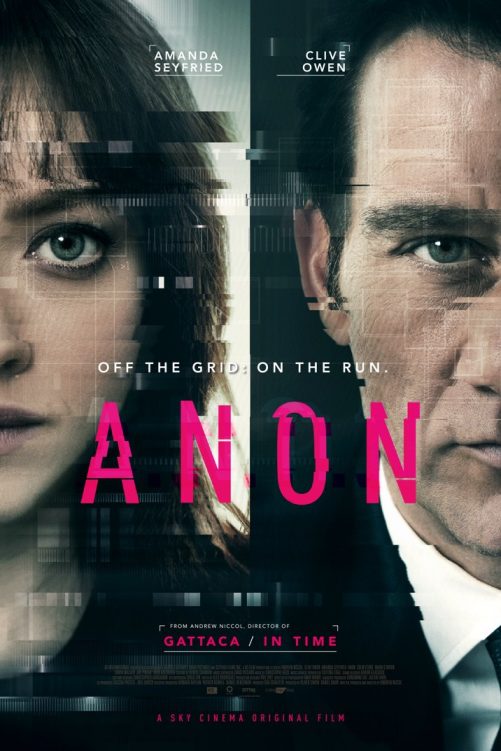Anon

The value of metadata has become such a prominent topic today that the timing of a movie like Anon seems even too fitting. The intention of writer-director Andrew Niccol was not really to portray a future that is far, far away, but rather to illustrate the disturbing evolution of the technological progress which we are already witnessing. As a result, the world in which we are immersed is a disturbing reality with many links to the present.
The Ether is a massive cloud storage system where all the citizen’s memories and identities are saved, and more or less accessible to everyone – depending on the authority of the person. There is no need whatsoever for a laptop or a screen because everything is controlled by thought and the eyes work as cameras. Resolving crimes isn’t an impossible task; it’s just a matter of time before the offender can be arrested. All of a sudden, however, a series of mysterious murders occur by the hand of someone able to masterly conceal her/his identity, enabling her to escape the surveillance system. Detective Friedland (Clive Owen) is determined to find the hacker (Amanda Seyfried), who is likely to be behind the killings. But is her anonymity really a threat?
Niccol – writer and director of Gattaca (1997) – beautifully develops a half-dystopian, half-progressive society. The scenarios are grim and stifling despite the many open spaces in which the action happens.
From the detailed and entirely legible bios identifying – like a scan – every single element in the frame, to the perfect alternation of cameras; from the paced dialogues to the refined visuals, the care taken with the production is clear. A certain absence of depth in the themes offered by the film, however, leaves the viewer rather unsatisfied – especially in the unfulfilling finale. All the focus is on the thrills coming from the linear whodunnit.
Anonymity, privacy, short-term detectable traces: all of these are treated as dangerous and prohibited, and they become gradually more and more attractive to the protagonist. There are inevitably many cinematic and literary references, from the complex algorithmic powers of The Matrix to the Orwellian watching eye of 1984. The main problem is the lack of fluidity among them.
The interactions between characters are rather distant; no physical contact appears apart from during sexual intercourse, which appears mostly dictated by instinct rather than feelings. Seyfried pushes her most swaggering look, generally in accord with the overall tone of the film. Her facial expressions are perfect for this narrative. Owen wonderfully wears the clothes of the detective, soon experiencing the distressing overturning of the investigation.
Cristiana Ferrauti
Anon is released nationwide and on Sky Cinema on 11th May 2018.
Watch our interview with Clive Owen and Andrew Niccol here:
Watch the trailer for Anon here:

























Facebook
Twitter
Instagram
YouTube
RSS